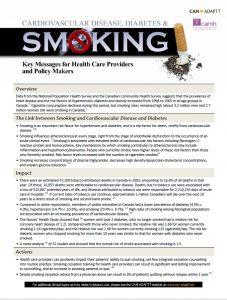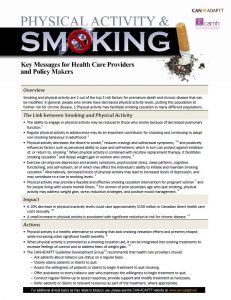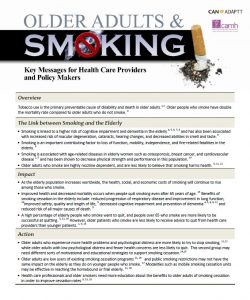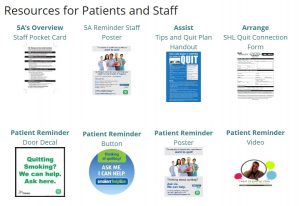PUBLIC HEALTH
Impact of interventions on tobacco use morbidity and mortality
Public Health Units offer a centralized hub for tailored cessation supports that could serve as a key referral point for smokers. If substantial numbers of health care providers implement minimal contact interventions, there will be a significant reduction in the number of tobacco users, a decrease in related tobacco diseases, and lowering of health care costs.
Evidence to support tobacco dependence interventions
Evidence suggests that the most important step in addressing tobacco use dependence is screening for tobacco use and offering minimal contact intervention messages at every opportunity to all people who use tobacco products ii
- Clinical Practice Guideline : Treating Tobacco Use and Dependence
- Discussion Paper: Exploring Opportunities for Developing a Coordinated Smoking Cessation System in Ontario
- Report: Smoke-free Ontario Strategy Monitoring
- Report: Tobacco Use in Canada: Patterns and Trends, 2017 Edition
- Registered Nurses Association of Ontario: Integrating Smoking Cessation into Daily Nursing Practice
- Report: Evidence to Inform Smoking Cessation Policy making in Ontario:
- Best Practice Guideline: CAN-ADAPTT
Examples of evidence-based practice systems
Sample Public Health Unit protocols/policies
Examples and resources for pharmacotherapy
- Patient/client tobacco use questionnaire: Hamilton Public Health Services
- Sample Medical Directive: Brant County Public Health Unit
- Free stop smoking medications are available in Ontario
Resources for public health unit staff
Resources Tailored for Public Health Patients & Staff:
| Cardiovascular Disease, Diabetes & Smoking Fact Sheet  |
Physical Activity & Smoking Fact Sheet  |
Older Adults & Smoking Fact Sheet  |
Additional Resources for all health care settings  |
Available for download. Contact your local Public Health Unit or Smokers’ Helpline for requests to adapt resources.
Training opportunities for public health unit staff
- Training opportunities for brief contact interventions with clients, as well more intensive interventions are available.
Monitoring and evaluation
- Ontario Tobacco Research Unit (August 2013). Data Standards for Smoke-free Ontario Smoking Cessation Service Providers
- Common measures and definitions are provided to ensure equivalent reporting by service providers.
- Key data standards and definitions are provided in this document for adult (18 years of age and older) tobacco users participating in smoking cessation programs.
- Utilize these data standards/questions and definitions when creating your patient assessment forms.
- Registered Nurses Association of Ontario Best Practice Guideline for Smoking Cessation – Evaluation Toolkit (hospital or clinic setting)
- Templates
- Chart audits questions
- In-clinic questions
- Post discharge follow-up interview questions
